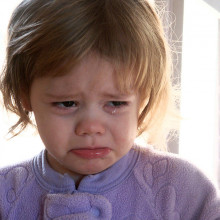What is the physiology behind emotional breakdown? Everybody has had the feeling in traumatic situations of getting all choked up, voice breaking and tears welling up. But why does it happen? We find out!
In this episode

The physiology of crying?
Hannah - So, what is going on in our bodies and brains during an emotional breakdown? And why is it that sometimes we can have such strong emotional reactions to things?
Joe - Hi. I'm Joe Herbert and I work in clinical neuroscience at Cambridge. So, why do emotions take over? Well, they take over because they're so important. Because it ensures the things that are good for you, arouse positive or pleasurable emotions and are therefore preferred. Whereas the opposite applies to things that are bad for you which give rise to negative emotions. But secondly, it acts as a vital part of social communication. It recruits others to help you or join recognizing emotions in others is an essential ingredient of good social relationships.
Hannah - And are there specific hormones or parts of the body involved in such emotional responses?
Joe - Your whole body takes part in emotions including two rather special hormones - adrenaline, which Americans call epinephrine surges out when you're frightened or excited, and makes your heart beat faster, and your breathing become deeper.
Your brain has adrenaline surge of its own and this makes you alert and pay attention.
If your emotion runs hard for much longer, a second hormone, cortisol joins in particularly if emotional experience is stressful. Cortisol sensitises your brain to unpleasant events and makes you remember them better. So, you avoid the situation that brings them about.
We don't yet know whether the brain has special chemicals that signal fear or happiness or anger, and so on, but it's possible they may exist.
Hannah - Thanks, Joe. So, strong emotional reactions are there to help us to communicate our feelings with others and also, to help us remember that particular situations should be avoided in the future.










Comments
Add a comment